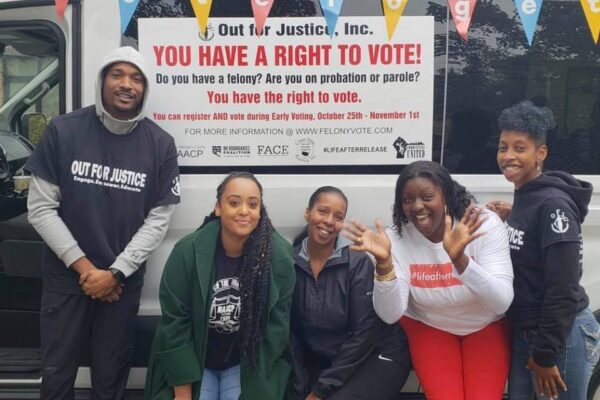PRINCE GEORGE’S COUNTY, MD – On September 30, 2020, State’s Attorney Aisha Braveboy held a press conference in which she addressed an effort to ensure voting for Marylanders who are incarcerated. During the press conference, Board of Elections Member Monica Roebuck stated that individuals with a felony conviction have their voting rights restored once they have completed their sentence. However, in the state of Maryland, individuals with felony convictions are eligible to vote once they are no longer incarcerated.
The following statement is from Joanne Antoine, Executive Director of Common Cause Maryland, Executive Director of Common Cause Maryland, and Dana Vickers Shelley, Executive Director of ACLU of Maryland:
“Given the importance of the 2020 Elections, it was disheartening to hear State’s Attorney Aisha Braveboy and Board of Elections Member Monica Roebuck provide inaccurate and misleading information to Prince George’s County residents about voting during their September 30 news conference. Unfortunately, BOE Member Roebuck misquoted the actual law, causing unintentional voter suppression by confusing Prince George’s residents who need to know that once they are released from incarcerated for a felony conviction, their right to vote is restored.
“The statewide coalition of voting rights advocates who have advised and collaborated with the Maryland State Board of Elections since early this year could have provided a more useful and thorough description of the local and statewide efforts to date, resources available, and ongoing needs, particularly as it relates to voting for Marylanders who are currently and formerly incarcerated.
“Qiana Johnson, Executive Director, Life After Release (Prince George’s County); Nicole Hanson Mundell, Executive Director, Out for Justice, Inc (Baltimore City); and Monica Cooper, Executive Director, Maryland Justice Project (Baltimore City), have long been recognized for leading nonprofits whose membership is comprised of citizens returning from incarceration, individuals who are behind the walls, and their communities. The State Board of Elections has turned to them to help get the word out and to serve as trusted intermediaries to convene important conversations between the community and SBE. If it had not been for Out for Justice Inc attending the SBE advisory board meetings, pushing them to establish a coordinated effort to craft the packets that SBE now have sent to every jail, this pretrial voting work would have probably been delayed another election cycle.
“These individuals bring their direct experience as being formerly incarcerated to their knowledge of voting rights and practices in Maryland. Over the past five years, they have worked with community members and advocates across the state to expand the ballot and ensure access to those behind the wall. Their effort has often been ignored and disregarded by elected officials and their access denied by local wardens. That needs to change immediately.
“As we at Common Cause Maryland and ACLU of Maryland continue to work in partnership and lift up the leadership of directly-impacted people, we call on elected officials and civic leaders to protect – and not exploit – their invaluable contributions to ensuring the promise of democracy is available to all Marylanders.”
###
Stay Informed
Sign up to be the first to hear about how to take action.
By completing this form, I agree to receive occasional emails per the terms of the ACLU’s privacy statement.
By completing this form, I agree to receive occasional emails per the terms of the ACLU’s privacy statement.


